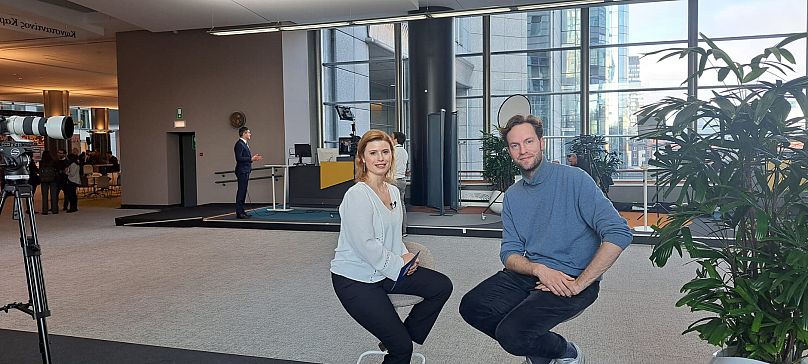EU DECODED: Will the Digital Euro strengthen financial security?

The digital euro is being considered by the European Central Bank as a new payment method available on a rechargeable card, a digital wallet or a mobile phone app.
This aims to tap into the trend in transactions: between 2019 and 2022, payments using banknotes and coins fell from 72% to 59% of total transactions in the European Union. By contrast, the number of transactions using electronic money jumped from 4.6 billion to 8.4 billion in the same period.
Opinions on the future digital euro are divided among residents interviewed by Euronews on the streets of Brussels and Lisbon.
"I really use the digital way [of paying] because it's easier, I don't need to have cash with me, it's on my phone, it's more practical, easy, quick," said a young man from Brussels.
"I have to say that I have already experienced situations where the card had to be suspended due to fraud and attempts to hack my account, so I confess that it makes me a little worried, I am not very sure about it, but it could be feasible," said a Lisbon resident.
The European Commission's proposal is being worked on not only by the ECB, but also by the European Parliament, with Damian Boeselager, a German MEP from the Greens, one of its most enthusiastic supporters.
"I think it is super exciting. It is a great innovation to think about. More and more people are using digital means of payment and currently we rely heavily, for example, on Apple Pay and other credit card providers to be able to pay," said Boeselager, who is one of the vice-presidents of the Committee on Economic and Monetary Affairs.
Private banking system is sceptical
The project is touted as inclusive since people without a private bank account or internet access could use the digital euro by creating an account through the post office or an online platform.
But privacy is a thorny issue, despite the ECB claiming it would not be able to identify payment habits. Fraud and money laundering could be difficult to detect without tracking mechanisms, and private banks fear they could lose customers.
"Banks are a bit worried or sceptical about the added value of this proposal, because we don't know the overall cost of this project. And also because they fear losing some depositors. The ECB has already said that it wants to ensure that this is just an alternative means of payment and not a savings vehicle for large amounts of money," said Paula Soler, a Euronews journalist covering the issue.
The digital euro could also boost Europe's financial sovereignty, but at what cost? In any case, we will have to wait two to three years for the process to get going, if it is ever approved.
Find out more details in the video!
Journalist: Isabel Marques da Silva
Production: Pilar Montero López
Video production: Zacharia Vigneron
Graphism: Loredana Dumitru
Editorial coordination: Ana Lázaro Bosch and Jeremy Fleming-Jones
Today


